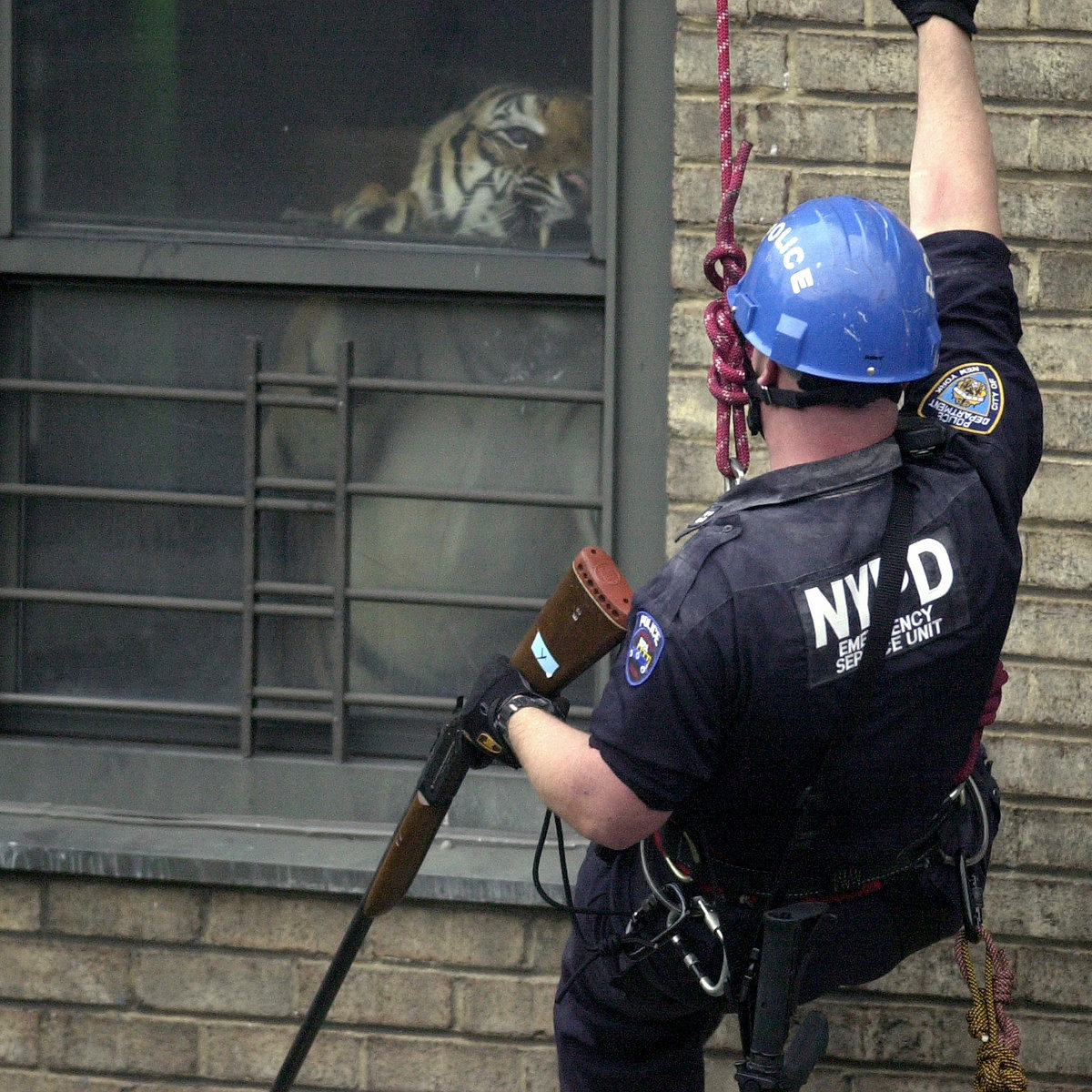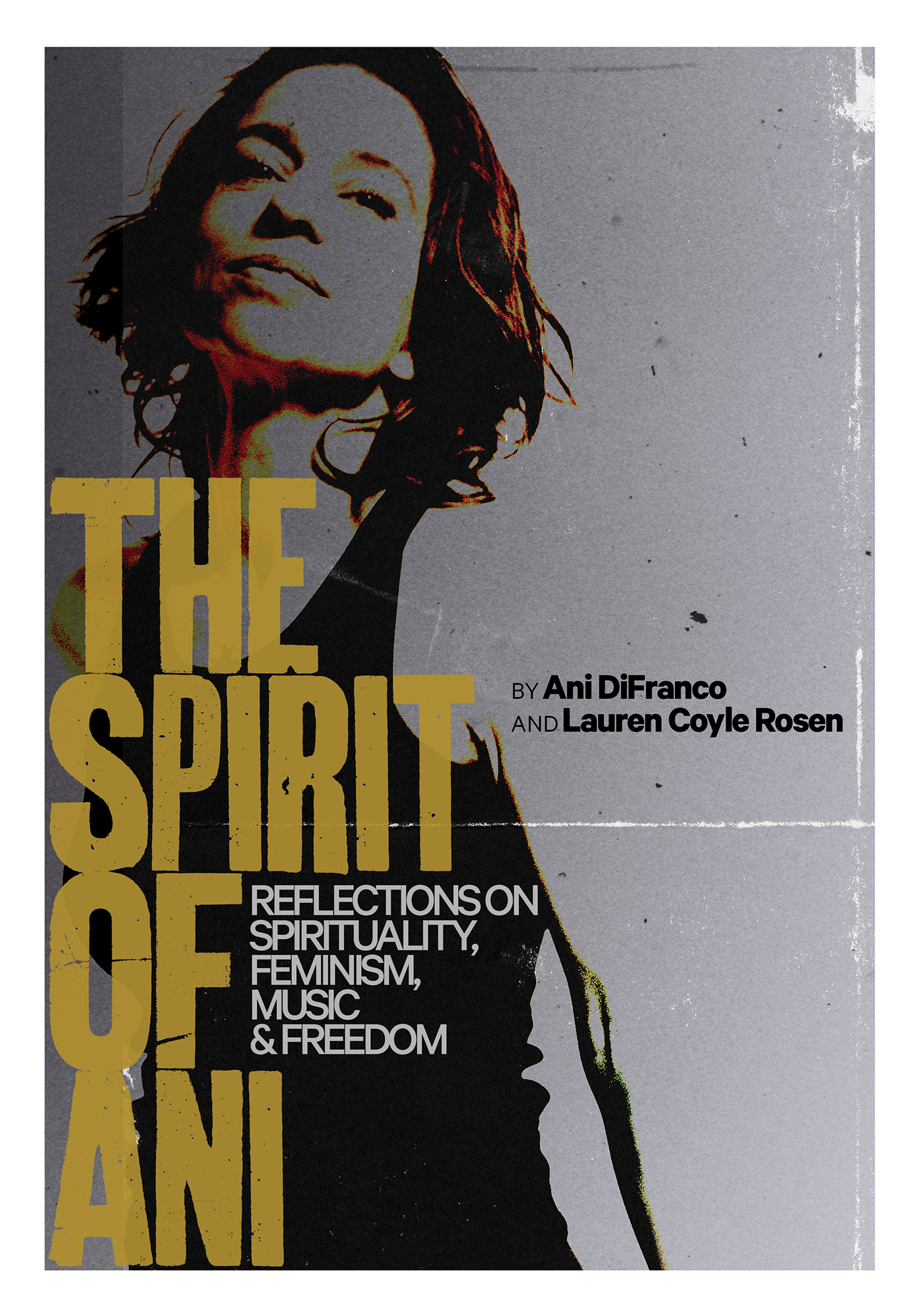Ming died last February. He was 19. At the time of his death, Ming, a Bengal tiger, was living at an animal sanctuary in Ohio. Before that, Ming lived in a five-bedroom apartment in a Harlem housing project. One of his roommates was an alligator named Al. Another was Antoine Yates, the part-time cabdriver who bought the infant Ming from a Minnesota animal park. Apparently, Yates' neighbors had just gotten used to the idea that a tiger lived in their building.
In September of 2003, Yates checked into an emergency room, claiming that his pitbull had bit him. Hospital staff realized that Yates' wounds weren't dog bites. Later on, the story came out that the tiger had lunged for a cat that Yates had just adopted, and Yates had been protecting the smaller animal. When police figured out that there was a tiger living in the apartment, a cop rappelled down from the roof of the building and shot Ming with a tranquilizer dart. After being shot, before falling asleep, Ming charged at the window.
The story of the tiger in the apartment instantly became one of those can-you-believe-it curio newsbites. The image of Ming at the window appeared on the cover of the New York Daily News. (Headline: "Hold that tiger!") But Elucid and billy woods, the two members of the New York rap duo Armand Hammer, looked at the image and saw something other than a funny and sensationalistic news report. They saw poetry.
At the end of "Pommelhorse," one of the songs from Armand Hammer's new album Shrines, we hear a sample of a man talking. It's presumably someone close to Armand Yates, though I haven't been able to find the original interview. The story that the man tells is a sad one: "My brother wanted to build a zoo. He wanted to build a utopia. Because when he looked around him, all he seen was destruction in our neighborhood." It's a beautifully quixotic image. A black man in America, underemployed and mired in public housing, still seeks to create something sublime in the world. The way that he goes about it is confused and damaged and dangerous, but then, so is everything else.
Music is funny. Timing is funny. Someone might bang out a protest song in an afternoon, and then that protest song might go up online the next day. But most of the new music that we're hearing wasn't made with this fraught, exciting, heartbreaking historical moment in mind. If music does find sudden resonance, it's basically an accident, or else it's a result of people addressing perennial issues that have simply returned once again. Armand Hammer, as it happens, made the perfect album for this damaged, corroded moment. It's just that they made it two years ago. Paraffin, Armand Hammer's 2018 LP, is a jangled, disoriented, masterful piece of art. On "Dettol," billy woods rapped about almost dying at the hands of a cop: "Chokehold slowly closed the airway / The Sunken Place, I can’t stay." George Floyd's story isn't new now, and it wasn't new then.
Maybe Armand Hammer are just two years ahead of us. Shrines is not an album about streets full of fire, about major-city mayors shamed into slumping back into their condos, about armored riot cops cracking old men's skulls, about heads of state then going on to accuse skull-cracked old men of being conspiring insurrectionists. Shrines is an album about people trying to build utopias on perilous and unstable piles of garbage. Armand Hammer take in the poison-cloud existential joke of a world around them, and they answer that joke with images as poetic as the tiger at the window.
On Shrines, rabbis wonder if their golems will work, and golems wonder if they are the first as they lurch, cursed. Dead NFL heroes' brains bob gently in solution, and now those men are just names, flickering memories. Flavor Flav's clock spins centrifugal. Dead cats lie in the street for a week. Empty lots where crack was once sold are now quiet as tombs, full of wild raccoons. At funerals, PVC piping replaces the cadavers' bones, and the families don't even know. White candles glow while billy woods plays his mother's piano in a bando. Elucid fire-dances on the head of the anointed, while out the smoke comes voices. Scream therapy coaxes melody from the noise.
The imagery is bleak and raw and angry, but it's strange and beautiful and funny, too. "We are bored of the apocalypse," says Elucid. Armand Hammer have transcendence in mind, instead -- even when that transcendence takes the form of an apocalyptically dark joke. And there are jokes. "Power people, not computers, black futures/ Nudging flat earthers off the block like Q*Bert." "I used to think I was better than this/ I was remiss/ I was impressed how they boiled it down to a gif." "Still waiting on that commencement speech invitation/ Cash-strapped HBCU, but I'll take it/ Plagiarized 'This Is Water'/ No Foster Wallace, but I'll fake it."
Shrines is a dense and abstract album musically as well as lyrically. The instrumentals -- from Earl Sweatshirt, Kenny Segal, and Fog's Andrew Broder, among others -- are bent and woozy, built around disconnected floating atmosphere rather than meter. It doesn't feel quite right to call them "beats." As rappers, Elucid and woods exist in the nether-region between spoken-word poetry and traditional rap music. Elucid is generally closer to spoken-word, while woods has more of a recognizable rap delivery, but both of them deliver hectic clusters of words without audibly worrying about dumb artificial categories like the ones I'm trying to force them into. The album has contributions from a few famous-ish voices -- Earl Sweatshirt, Quelle Chris, R.A.P. Ferreira, Moor Mother -- and all of them lock into the same urgent free-verse vibe. This, I think, shows the kind of esteem that the duo's peers grant Armand Hammer. To the extent that an abstract underground rap album can be an event, this is one.
But there's nothing self-congratulatory on Shrines. It's not agit-prop either. On Shrines, Armand Hammer don't cry for revolution. Instead, they offer up a case study of what can happen to sharp, restless brains when the machine of exploitative American racism crushes the souls attached to those brains. Elucid: "It started as a lesson of achieving dreams and reaching fantastical heights/ Ended with us watching the Challenger rocket smoldering on the black-and-white." billy woods: "In this side-scrolling 8-bit bullet hell, I'm patient/ Graceful as third-generation bomb makers." Elucid: "In the summer before 9/11, I slept with my boots on where I could." billy woods: "I’m a black hole, I’m a light bender."
On Shrines, Elucid and billy woods turn to abstract expressionism as if abstract expressionism is the only thing that makes sense. It takes a whole lot of work and attention to puzzle out almost everything that Elucid and woods say on Shrines; I'm confident that I understand less than half of it. But the work doesn't feel like work. It's a real pleasure to sit down with the Shrines Genius page, to stare at the words transcribed out line-for-line, even if that's something that Armand Hammer themselves don't endorse. The level of writing on Shrines, the level of imagination, isn't something I can properly convey when the album is only five days old. It'll take time, and it will reward that time.
ELUCID is against printing lyrics, so Armand Hammer lyric book not gonna happen.
— Backwoodz Studioz (@BackwoodzHipHop) June 5, 2020
There will be a lyric booklet with every woods' album till he's done because god forbid those incoherent rapgenius transcriptions are all that's left after the cataclysm
After animal control carried the unconscious tiger down in the elevator of Antoine Yates' apartment building, New York police arrested Yates' mother. She'd been babysitting kids in the same apartment where Yates was keeping Ming, so she was charged with child endangerment. Yates took a plea deal, partly to reduce the charges against his mother, and he served three months in prison for reckless endangerment and possession of a wild animal. Michael Jackson, Jermaine Jackson, and Kool & The Gang keyboardist Amir Bayyan reportedly helped Yates financially, and he sold the movie rights to his story. He used that money to move to Las Vegas, and he apparently now owns a couple dozen big cats. He changed his name to Antoine Tigermann Yates. He's on Instagram.
On Twitter a couple of weeks ago, Armand Hammer collaborator Earl Sweatshirt wrote, "the role of fantasy in liberation is huge. we are tasked with creating something that we cant really see. building the plane while its flying." On Shrines, billy woods compares black life in America to the tornado that sweeps Dorothy away to Oz, and Elucid says, "I’m rehearsing for a world where you don’t exist." Elucid and billy woods, just like Antoine Tigermann Yates, are warriors of the imagination. Salute them.
FURIOUS FIVE
1. Johnniqua Charles - "Lose Yo Job (DJ Suede The Remix God & iMarkkeyz Remix)"
Every movement needs an anthem. This time, the anthem comes from a viral video of a then-homeless woman being handcuffed outside the strip club where she'd accidentally left her purse. Get this dance.
https://twitter.com/Remixgodsuede/status/1268373310410240001?ref_src=twsrc%5Etfw%7Ctwcamp%5Etweetembed&ref_url=https%3A%2F%2Fwww.buzzfeednews.com%2Farticle%2Fjuliareinstein%2Flose-yo-job-viral-video-woman-johnniqua-charles
2. Mr. Muthafuckin' eXquire - "Bootlicker (Burn Baby Burn)"
"When you shackled and depressed, your color justifies your death/ They yelling at you, 'Stop resisting' with they knee inside your neck." Pure, cleansing, fire.
3. Juicy J - "Hella Fuckin' Trauma"
Do you know how fucked up shit has to be for Juicy J to vent his political rage? I haven't heard him get this pissed off since he went off on Hurricane Katrina on the Chrome album outro.
4. Pooh Shiesty - "ABCGE" (Feat. Big 3)
I hope a whole lot more people use the current moment as a music-video backdrop. The ethics here get a little fuzzy, but the aesthetics are just beautiful.
5. Aitch - "Triggered"
The "Bills, Bills, Bills" harpsichords will live forever.
IT WAS ALL GOOD JUST A WEEK AGO
https://twitter.com/macfathom/status/1269764484786249731?ref_src=twsrc%5Etfw






